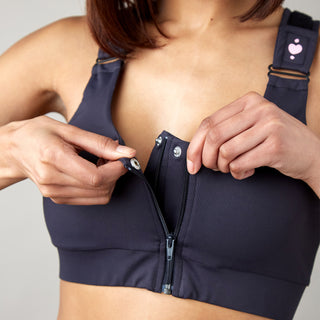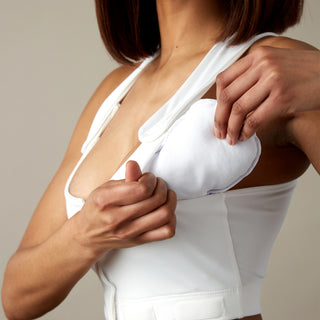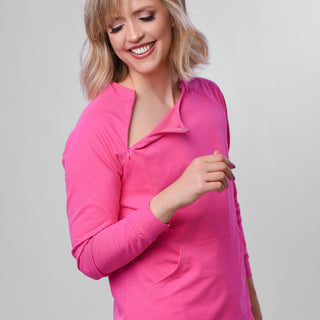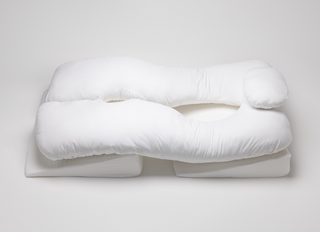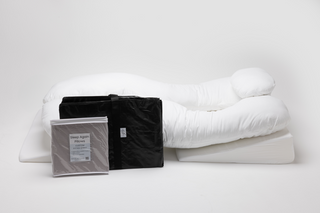When someone you care about is diagnosed with breast cancer, your heart immediately wants to help. You probably find yourself scrolling through Amazon at 2 AM, wondering what gesture could possibly convey your love and support during such a challenging time. Here's the thing though: good intentions don't always translate to good gifts.
Breast cancer patients face unique physical, emotional, and practical challenges that most of us never consider. What seems like a thoughtful present to you might actually create more stress, discomfort, or even health risks for someone navigating treatment. Before you click "add to cart" on that seemingly perfect gift, let's talk about what to avoid – and more importantly, what actually makes a difference.
Why Some Gifts Miss the Mark (It's Not Your Fault)
The gift-giving landscape changes dramatically when breast cancer enters the picture. Suddenly, that adorable push-up bra becomes completely impractical. The fancy dinner reservation conflicts with unpredictable treatment side effects. The beautiful bouquet of lilies could literally pose a health risk.
It's not that breast cancer patients are ungrateful or difficult to please. Their needs have simply shifted in ways that aren't immediately obvious to those of us on the outside looking in. Understanding these changes is the first step to becoming a truly supportive gift-giver.
Physical comfort becomes paramount. Emotional sensitivity runs high. Energy levels fluctuate wildly. Immune systems need protection. These factors should guide every gifting decision you make.
The Hall of Fame: Worst Gifts for Breast Cancer Patients
1. Traditional Underwire Bras (AKA Torture Devices in Disguise)
Let's start with the most obvious offender. That gorgeous lacy bra with the perfect amount of push-up might have been her go-to before diagnosis, but post-surgery? It's basically medieval torture equipment.
Underwire bras can press against surgical sites, irritate healing incisions, and interfere with drainage tubes. They're also completely incompatible with breast forms or the choice to go flat. Plus, many breast cancer patients experience significant changes in breast size and shape throughout treatment, making traditional sizing obsolete.
The better choice: Soft, wireless mastectomy bras designed specifically for post-surgery comfort. heart&core offers beautiful, supportive options that accommodate breast forms and provide gentle compression for healing. Their mastectomy bras combine medical functionality with style – because cancer doesn't mean giving up on feeling attractive.
2. Fresh Flowers (Beautiful but Potentially Dangerous)
This one breaks hearts because flowers seem like such a universally appreciated gift. Unfortunately, they're actually banned from many oncology units for good reason. Fresh flowers and plants can harbor bacteria, mold, and fungal spores that pose serious risks to immunocompromised patients undergoing chemotherapy.
Beyond the health risks, flowers can trigger unexpected emotional responses. Some people associate them with funerals or hospitals, creating unwanted mental connections during an already difficult time.
The better choice: Artificial flowers that look incredibly realistic or a decorative lamp that brightens the space without the health risks. If you're set on something that "grows," consider a low-maintenance succulent in a pretty pot once treatment is complete.
3. Scented Anything (Candles, Lotions, Perfumes)
Chemotherapy wreaks havoc on the senses, particularly smell and taste. Scents that once brought joy can suddenly trigger intense nausea or headaches. Even mild fragrances can become overwhelming and unpleasant. This makes scented candles, perfumed lotions, and fragrant bath products problematic gifts.
The last thing someone dealing with chemo-induced nausea needs is a "relaxing" lavender candle that makes them feel worse.
The better choice: Unscented, gentle skincare products designed for sensitive skin. Look for moisturizers specifically formulated for cancer patients, which tend to be fragrance-free and extra nourishing for skin that may be dry or irritated from treatment.
4. Tight or Complicated Clothing
That cute bodycon dress or intricate wrap top might be stunning, but it's completely impractical for someone with surgical drains, port access needs, or post-mastectomy sensitivity. Tight clothing can restrict healing, cause discomfort, and make medical appointments unnecessarily difficult.
Similarly, clothes with complex fastenings, tiny buttons, or overhead styling become frustrating when dealing with limited mobility or neuropathy in the hands.
The better choice: Soft, loose-fitting clothes with front closures. Think button-up pajama sets, zip-up hoodies, or comfortable loungewear. These items provide comfort and dignity while accommodating the practical realities of treatment and recovery.
5. Tickets to Future Events
Concert tickets for next month? Weekend getaway vouchers? These gifts come from a place of hope and optimism, but they can create anxiety rather than joy. Breast cancer treatment is unpredictable – someone might feel great on Tuesday and terrible on Wednesday. Committing to future plans can feel overwhelming when you can't predict how you'll feel from day to day.
The better choice: Flexible experiences that can happen at home and on their timeline. A streaming service subscription, a collection of audiobooks, or ingredients for a cooking class they can do whenever they feel up to it.
6. Diet and Exercise Programs
Unless you're a qualified oncologist (and even then, it's questionable), avoid gifting anything that suggests they need to change their diet or exercise routine to "beat cancer." Juice cleanses, workout programs, and diet books come across as judgment disguised as help.
Breast cancer patients are already working with medical professionals to optimize their health. Your gift shouldn't imply that they're not doing enough.
The better choice: If you want to support their wellness journey, ask what they need. Maybe it's grocery delivery, prepared meals, or a comfortable yoga mat for gentle stretching when they feel up to it.
7. "Inspirational" Books About Fighting Cancer
While some people find inspiration in cancer survival stories, others find them overwhelming, preachy, or anxiety-inducing. These books often promote the idea that having a positive attitude is crucial to survival – a message that can make people feel guilty for having bad days or realistic fears.
The better choice: Ask about their reading preferences and choose something in their favorite genre. Escapist fiction, funny memoirs, or hobby-related books can provide mental relief without cancer-focused pressure.
8. Elaborate Skin Care Routines
Multi-step skincare systems with acids, retinoids, or active ingredients can be harsh on skin that's already compromised by chemotherapy or radiation. Treatment can make skin extremely sensitive, dry, and reactive to products that were previously fine.
The better choice: Simple, gentle skincare products recommended for cancer patients. Look for fragrance-free, hypoallergenic options that focus on basic moisturizing and protection rather than anti-aging or corrective treatments.
9. Surprise Visits or Drop-in Gifts
Showing up unannounced – even with the best intentions – can be stressful for someone managing fatigue, nausea, or simply having a bad body image day. Cancer patients often need advance notice to mentally and physically prepare for visitors.
The better choice: Coordinate your visit in advance and ask what they need. Sometimes the best gift is handling errands, bringing a meal, or simply being available for a phone call when they're ready.
10. One-Size-Fits-All Approach
Perhaps the biggest gifting mistake is assuming all breast cancer patients need the same things. A newly diagnosed patient has different needs than someone finishing treatment. Someone who chose reconstruction has different concerns than someone who went flat. Age, lifestyle, and personal preferences all matter enormously.
The better choice: Pay attention to their specific situation and preferences. When in doubt, ask directly or choose versatile gifts that can be useful regardless of their treatment path.

Thoughtful Gifts for Breast Cancer Patients: The Good Stuff
Now that we've covered what to avoid, let's talk about gifts that truly make a difference:
Comfort-focused clothing and undergarments: Mastectomy bras and post-surgical wear from heart&core are designed by people who understand the real needs of breast cancer patients. These aren't medical devices masquerading as lingerie – they're beautiful, comfortable pieces that restore dignity and confidence during treatment. Not sure what size to buy? Not a problem. heart&core offers gift cards for post-surgical bras.
Recovery sleep support: Sleeping following a mastectomy can be a serious challenge. Support better sleep and better healing following surgery by gifting the Sleep Again Pillow System, a full-body system designed to support elevated back sleeping during mastectomy recovery.
Practical support: Gift cards for grocery delivery, housecleaning services, or meal kit deliveries address real, ongoing needs without requiring the recipient to pretend to love something they can't use.
Entertainment for low-energy days: Premium streaming subscriptions, audiobook memberships, or adult coloring books provide distraction and enjoyment when physical energy is limited.
Self-care essentials: High-quality, unscented moisturizers, soft blankets, comfortable slippers, or a cozy robe can provide daily comfort throughout treatment.
Connection and memories: A photo book of shared memories, a heartfelt letter, or a care package with small items that remind them of your friendship can provide emotional support that lasts far beyond treatment.
The Art of Asking (It's Okay to Be Direct)
Here's a revolutionary idea: ask them what they need. Cancer patients often appreciate directness over surprise gifts. You might say, "I'd love to get you something helpful. Are there any specific things that would make your daily routine more comfortable?" or "Is there anything you're wishing you had right now?"
This approach accomplishes several things: it ensures your gift will actually be useful, it gives them control over their support network, and it shows that you're thinking about their specific needs rather than generic cancer patient needs.
Timing Matters More Than You Think
The best gift for someone newly diagnosed might be completely different from what helps during active treatment or recovery. Early on, they might need practical items for hospital stays or post-surgery comfort. During treatment, focus shifts to managing side effects and maintaining quality of life. During recovery, gifts that help them reclaim their identity and confidence become more relevant.
When You Get It Wrong (And You Might)
Even with the best intentions and careful consideration, you might still miss the mark. That's okay. What matters is your response when this happens. If someone seems less than thrilled with your gift, don't take it personally or pressure them to use it. A simple "I'm sorry that wasn't helpful – what would be more useful?" goes a long way.
Sometimes the best gift is acknowledging that you don't fully understand their experience and asking how you can better support them.
The Long Game: Support Beyond Treatment
Most people shower cancer patients with attention and gifts during active treatment, then disappear once treatment ends. But recovery continues long after the last chemo session. Consider spreading your support over time – a care package during treatment, a celebration gift at the end of treatment, and check-ins during the months of recovery that follow.
This is when gifts that help rebuild confidence and reclaim normalcy become especially meaningful. Beautiful post-mastectomy lingerie, comfortable clothes that fit their changed body, or experiences that help them feel like themselves again can be incredibly powerful.
The Bottom Line
The worst gifts for breast cancer patients aren't necessarily expensive or cheap, big or small. They're simply gifts that ignore the reality of what the recipient is experiencing. The best gifts acknowledge their current situation while honoring their dignity, comfort, and individual preferences.
Before you buy anything, ask yourself: Does this gift make their life easier, more comfortable, or more joyful? Does it work with their current physical limitations? Does it respect their medical needs and personal preferences? If you can't answer yes to these questions, keep looking.
Remember, your presence and ongoing support matter more than any single gift. The most meaningful gesture might be showing up consistently, listening without trying to fix everything, and adapting your support as their needs change.
When you do give a physical gift, choose something that says "I see you as a whole person, not just a patient" and "I want to make this easier for you in whatever small way I can."
Cancer might change someone's needs, but it doesn't change their worth, their preferences, or their desire to feel beautiful, comfortable, and supported. The best gifts reflect this understanding and show that you're paying attention to who they are, not just what they're going through.
Your thoughtfulness already means more than you know. With a little consideration and maybe some direct communication, your gifts can provide real comfort and support during one of life's most challenging journeys.



